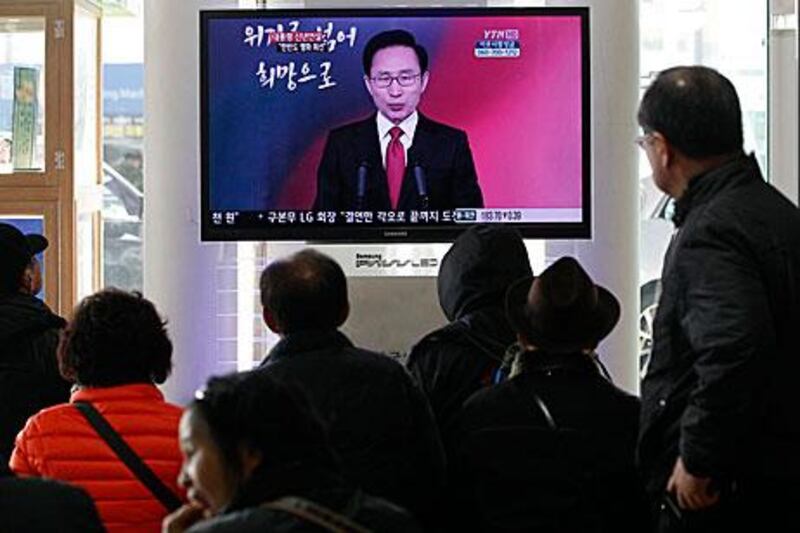BEIJING // Relations on the Korean peninsula were near a "turning point" in which the six-party talks on North Korea's nuclear programme could be restarted, South Korea's president said yesterday.
The comments from Lee Myung-bak, entering his last year in office, come shortly after Kim Jong-un took over as North Korean leader following the death of his father Kim Jong-il last month.
They contrast sharply with hardline statements from North Korea in recent days, with the secretive nuclear-armed country's national defence commission last week insisting there would be "no dealings with the Lee Myung-bak group of traitors".
"The situation on the Korean peninsula is now entering a new turning point," Mr Lee said in a televised address. "But there should be a new opportunity amid the change and uncertainty."
Mr Lee has taken a tough stance with the North since coming to power in 2008, cutting food aid programmes in the absence of promises from Pyongyang over its nuclear programme.
In recent months he has adopted a softer position following criticism he may have inflamed tensions, which reached a height in 2010 when North Korea shelled South Korea's Yeonpyeong island and was blamed for sinking a South Korean warship, the Cheonan.
South Korea has previously insisted six-party talks over North Korea's nuclear programme can only be restarted if Pyongyang apologises over the Cheonan and Yeonpyeong incidents and suspends uranium enrichment, a route to making nuclear weapons.
In yesterday's address, Mr Lee appeared more conciliatory although he restated the South's insistence that North Korea must curb its nuclear ambitions.
"As soon as North Korea suspends nuclear activities in progress, six-party talks should be able to resume," he said. "Through a six-party agreement we are prepared to ease the north's security concerns and provide the necessary resources to revive its economy."
Pyongyang has been keen to revive the six-party talks, on ice since the North walked out of them in April 2009, but sceptics believe the regime is looking for food aid and other benefits without being serious about denuclearisation. The six-party talks were first held in 2003 as a result of Pyongyang's withdrawal from the nuclear non-proliferation treaty and involve North and South Korea, China, the United States, Russia and Japan.
Perhaps mindful of what was seen as a weak response after North Korea's shelling of Yeonpyeong in November 2010, Mr Lee yesterday said South Korea would "respond strongly if provoked" again.
Opinion is sharply divided within South Korea over the best way to deal with its neighbour, which suffers food shortages and a stagnant economy, and is now led by a 20-something political novice.
The Network for North Korean Democracy and Human Rights, based in Seoul, is among the groups arguing against a conciliatory approach, believing North Korea may seek confrontation to shore up the new leader's position. This situation, said the group's international coordinator, Jin Park, meant the South Korean government "should respond harshly to any provocation".
"If they show pacifism ... North Korea will interpret this as an inherent weakness of the South Korean citizens. They will provoke further," he said.
Other observers, among them Paik Hak-soon, a senior fellow at the Sejong Institute think-tank, believe provocation from Pyongyang is "unlikely" and have said the South should have tried harder to build bridges after Kim's death. Mr Lee's hopes for a turning point therefore represented a "hollow voice".
"People are disappointed because the South Korean government lost the window of opportunity for the new chapter because they made mistakes with condolence issues," Mr Paik said.
South Korea did not send a condolence delegation or allow South Koreans unrestricted travel to the North to express sympathy after Kim's death, sparking criticism from Pyongyang.
A presidential election in South Korea is scheduled for December and Mr Lee, ineligible by law to run for a second term, will step down in early 2013.






